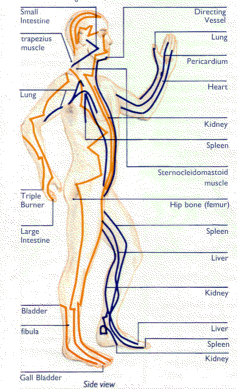
Coventry T'ai Chi
Chinese Medicine
Traditional Chinese Medicine is a form of healing which has been developed over the last 6000 years, and has become very good at gently curing a vast array of complaints. However, it comes with a health warning: Don't go around thinking you can read a couple of websites and practice Chinese medicine on your friends - They won't thank you for it.
The best person to treat you is yourself, because you know your own body best. Having said that, when I expressed an interest in this area as a career, my teacher told me that it could take up to ten years of dedicated t'ai chi training to achieve the required levels of sensitivity and energy before I could actually practise on others. T'ai chi is a good starting point because you get to know your own body and your own mind, and you gradually develop these qualities over time, and come to see things in others which can tell you how they're feeling. But although it can be frustrating to have ambitions to help people and all the enthusiasm and good intentions to back it up, always remember: "A journey of a thousand miles begins with a single step."And then another. And then another. And the steps don't necessarily get any bigger as you go through your training. Take it slowly and look after yourself, and you'll be fine...
Chinese Medicine, in contrast to Western Medicine, tends to divide and categorise illness and conditions under fairly simple principles of Yin and Yang, and extrapolate its principles from there. In this sense it is far less complex than Western medicine, which takes quite a reductive approach to the human body, trying to identify which nano-molecule has caused a particular condition. Chinese medicine is a much more holistic approach which states that, although one particular part of the body may have gone 'wrong', the body system as a whole will then need to be treated in order to regain equilibrium. This is done not by addressing the defective molecule, but by addressing root causes, which may be physical, mental, spiritual or even entirely external to the body. For instance, where in the West a condition may be attributed to a 'virus', the TCM approach would want to find out what other factors within the body would have allowed the external virus to have such an effect: Was the immune system weak? If so, was this due to a stressful lifestyle, physical over-exertion or constitutional weakness? In other words, we need to look to treat not the disease so much as the patient.

This is not to say that Western medical theory is entirely wrong, it simply looks at things from a different angle. Chinese medicine has been practised now for thousands of years and as such has built up a huge database of experiential evidence to support it. That doesn't make it easy to understand, but the best thing for any taoist to do is to practise medicine on themselves, by observing their own bodies, and the way it reacts to its environment. For example, what foods affect it adversely, what weather conditions are unfavourable, what seasons, what other types of people? Once you start to be able to observe these phenomena in yourself, you'll also probably find that you can observe similar things in other people, and then the whole world becomes your petri dish!!!!
The following useful web-pages provide a good starting point for anyone wishing to understand the basic concepts of traditional Five Element Chinese Medicine.
The Five Elements:
Fire - http://www.5elements.com/docs/elements/fire.html
Earth - http://www.5elements.com/docs/elements/earth.html
Metal - http://www.5elements.com/docs/elements/metal.html
